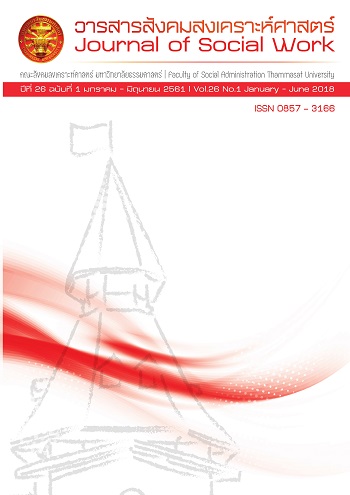A Study on Fairness and Humanity of Assets Forfeiture in Drug Cases
Keywords:
Assets Forfeiture (Confiscation), Drug CasesAbstract
A Study on “Fairness and Humanity of Assets Forfeiture (Confiscation) in Drug Cases" has 3 main purposes. First, to study the concept of the measure for the suppression of offenders in an offense relating to narcotics Act, B.E. 2534. Second, to determine whether section 27 of the Act include the property that is not in the condition of execution (exempt from executions) under the Code of Civil Procedure Section 285, the court can forfeit (or confiscate) it or not. And, Third, to propose guidelines in accordance with the confiscation in Section 27 of the Act, which base on the principle of fairness and humane. Research method is Qualitative Research.
The results showed that, from the concept of the theory of forfeiture and confiscation. It can be said that in the forfeiture or confiscation. There are four types of property that must be forfeiture or confiscated: 1) prohibited goods (illegal goods); 2) property obtained from criminal offenses, which means the benefits, income, assets generated by illegal enterprises directly and indirectly; 3) property used in the commission of the crime, and 4) property related to the organization or company of the offender. At present, in the forfeiture or confiscation of property of the offender, there are three main measures: 1) civil measure; 2) criminal measure; and 3) administrative measure.
The recommendations from the study are as follows.
In aspect of Policy and Law: 1) The Measure for the Suppression of Offenders in an Offense relating to Narcotics B.E. 2534 Act, should be amended to limit the scope of some terms such as "assets related to the offense on drugs" 2) The Act should be amended the time period for property owners or real stakeholders who request the return of assets (section 30) 3) The Act should be revised to increase the standard of burden of proof as the duty of prosecutor. 4) The Act should be limiting the power of the authorities to seize the assets of criminals on drug cases, according to the Civil Procedure Law, Section 285 and Section 286 (a property that is not in the condition of execution) In aspect of Management: 5) Law enforcement agencies under the Act should set a management plan focusing on civil rights. 6) In case of the property requested by the prosecutor for confiscating, if the third party (owner) does not have any knowledge of the offense. The prosecutor should not file a petition for the court to order the confiscation of the property. 7) The authorities should abide by the law on the declaration of property confiscation in local newspapers. 8) Time expansion should be provided to the accused or defendant’s heirs who request the return of assets in case of the accused or the defendant dies during prosecution or trial.
In aspect of Operation: 9) The related law enforcement agencies should focus on training, strengthen awareness, educate their staffs regarding the importance of property rights of individuals. 10) Timing framework, clear rules and regulations for the delivery of the property to the investigating officer/related competent authority should be set up. 11) The technology tools used to monitor and investigate the property should be developed more effectively. 12) Drug traffickers should be classified in narcotics cases, such as they are small or large drug dealers. Moreover, check and balance on the power of the authorities must be concerned.
References
นราวรรณ พรมจรรย์. (2554). การริบทรัพย์สินที่ได้ใช้หรือมีไว้เพื่อใช้ในการกระทำความผิด. (วิทยานิพนธ์มหาบัณฑิต). มหาวิทยาลัยธรรมศาสตร์, บัณฑิตวิทยาลัย, (นิติศาสตร์).
เนาวรัตน์ น้อยผล. (2536). การป้องกันและปราบปรามการกระทำความผิดเกี่ยวกับยาเสพติดโดยมาตรการริบทรัพย์สินตามพระราชบัญญัติมาตรการในการปราบปรามผู้กระทำความผิดเกี่ยวกับยาเสพติด พ.ศ.2534. (วิทยานิพนธ์มหาบัณฑิต). จุฬาลงกรณ์มหาวิทยาลัย, บัณฑิตวิทยาลัย, (นิติศาสตร์).
บุญญวิจักษณ์ เหล่ากอที. (2547). มาตรการทางกฎหมายในการปราบปรามองค์กรอาชญากรรมยาเสพติด. สำนักงานคณะกรรมการป้องกันแลปราบปรามยาเสพติดกระทรวงยุติธรรม. ในเอกสารการประชุมทางวิชาการระดับชาติว่าด้วยงานยุติธรรม ครั้งที่ 2, ศูนย์การประชุม อิมแพ็คเมืองทองธานี, 6-7 กันยายน 2547.
มานิตย์ จุมปา. (2549). คำอธิบายรัฐธรรมนูญแห่งราชอาณาจักรไทย (พ.ศ.2540) รัฐธรรมนูญแห่งราชอาณาจักรไทย (ฉบับชั่วคราว) พุทธศักราช 2549 พร้อมข้อเสนอสําหรับรัฐธรรมนูญแห่งราชอาณาจักรไทย (พ.ศ. 2550) (พิมพ์ครั้งที่ 8). กรุงเทพฯ: นิติธรรม.
วัฒนา ชั้นบุญ. (2540). การดำเนินคดีริบทรัพย์สินให้ตกเป็นของกองทุนป้องกันและปราบปรามยาเสพติด. (วิทยานิพนธ์มหาบัณฑิต). มหาวิทยาลัยธรรมศาสตร์, บัณฑิต-วิทยาลัย, (นิติศาสตร์).
สำนักตรวจสอบทรัพย์สินคดียาเสพติด. (2548). รวมคำพิพากษาคดีตรวจสอบทรัพย์สิน. กรุงเทพฯ : สำนักงาน ป.ป.ส. กระทรวงยุติธรรม.
อนุชาติ คงมาลัย. (2558). (อัยการอาวุโส). พระราชบัญญัติมาตรการในการปราบปรามผู้กระทำความผิดเกี่ยวกับยาเสพติด พ.ศ.2534 และคำวินิจฉัยศาลฎีกา. กรุงเทพฯ: คลังสมองอัยการ.
Abadinsky, Howard. (1987). An introduction: Crime and Justice. U.S.A.:Nelson-Hall Publishers/Chicago.
Beccaria, Cesare. (1764). Of Crimes and Punishment. English translated by Jane Grigson, Reprinted by arrangements with Oxford University Press 1964.
Dery, Alice W. (2012). Overview of Asset Forfeiture. American Bar Association. Retrieved From http://www.americanbar.org/publications/blt/2012/06/ 02_dery.html
Dunn, Kyla. (2000). Reining in Forfeiture: Common Sense Reform in War on Drugs. Retrieved from www.cps.gov.uk/legal/s_to_u/sentencing_and_ancillary_ orders_applications/#a20
Ehlers, Scott. (1999) Senior Policy Analyst, POLICY BRIEFING: Asset Forfeiture. Drug Policy Foundation.
Guidance for prosecutors and investigators on their asset recovery powers under Section 2A of the Proceeds of Crime Act 2002.(2009) Retrieved from https://www.gov.uk/guidance/asset-recovery-powers-for-prosecutors-guidance-and-background-note-2009
Hinterseer, Kris. (2002). Criminal Finance: The Political Economy of Money Laundering In a Comparative Legal Context. Netherland: Kluwer Law International.
Miller, Mitchell J. (Editor-in-Chief) (2014). The Encyclopedia of Theoretical Criminology (1). U.S.A.: Wiley-Blackwell.
National Crime Prevention Institute. (1986). Understanding Crime Prevention. U.S.A.: Butterworth Publishers.
Worrall John L. (2016). Asset Forfeiture. Center for Problem-Oriented Policing, State University of New York at Albany, Retrieved from http://www.popcenter.org/Responses/asset_forfeiture/print/
Downloads
Published
How to Cite
Issue
Section
License
The manuscripts published in the Social Work Journal is the copyright of the Social Work Journal, Thammasat University
Any article or opinion appeared in the Social Work Journal will solely be under the responsibility of the author The Faculty of Social Administration, Thammasat University and the editors do not need to reach in agreement or hold any responsibility.



